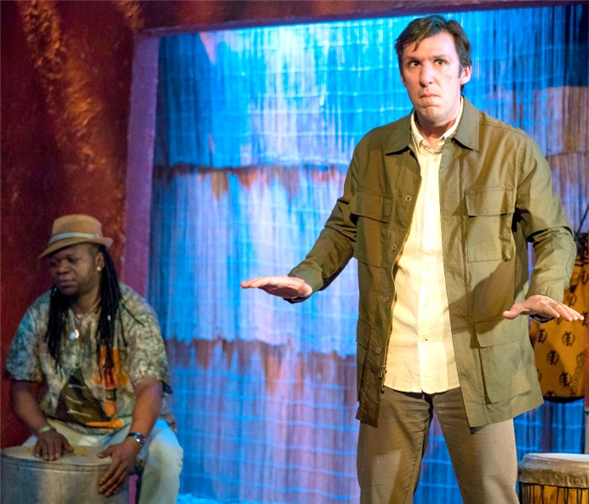Translate Page

A new solo show grapples with a bloody period in Africa's history
---
Back in 2011 while attending a theatre festival in Rwanda, performer and playwright Sean Christopher Lewis spotted a man in a pink jumpsuit walking through a village market. Intrigued, Lewis asked his local companions about the unusual sartorial choice and was shocked by their answer: It meant the man had participated in the Rwandan genocide when at least 500,000 citizens were massacred by their fellow countrymen over a 100-day period in 1994. The reconciliation process required the now-reformed murderers to wear the striking suits as a visible sign of penance.
During his sojourn, Lewis was also surprised to encounter so many young American missionaries spreading the gospel in Rwanda. Those two images -- the remorseful murderer and the white proselytizers -- haunted Lewis long after he returned home, and they eventually inspired him to pen the solo show Dogs of Rwanda, currently playing at Urban Stages.
"It was one of those things where I wasn't really able to write anything else," Lewis recalls. "I don't know how it is for other writers but for me, writing is about processing my experience."
Dogs of Rwanda focuses on a former teen missionary named David Zosia (played by Dan Hodge) who published a memoir about the genocide. When he receives a letter from a Rwandan he knew challenging his account, David returns to the country to try to reconcile what happened in their shared past.
{Image1}
Many of Dave's stories about contemporary Rwanda -- such as visiting a museum in the town of Nyamata that exhibits the bloody clothes and bones of genocide victims -- come directly from Lewis' own life. Yet the playwright admits he still felt some trepidation about being a white guy writing about such a momentous African event.
"I think when you create characters of a different race or religion than yourself, it's honest to say that there's a level of fear," he says. "There's got to be a level of, why am I doing this? Is it storytelling or is it just like straight appropriation? I think that's a huge thing that all of us white artists are recently starting to come to terms with."
Initially, Lewis performed the show himself in the style of one of his heroes, the late Spalding Gray, sitting at a desk speaking directly to the audience. He toured it anywhere he could, from friends' living rooms to nursing home cafeterias. "I learned so much from the audiences' responses," he says. "Also, my mouth is way more honest than my pen. When I'm writing stuff I really want to be smart, but my mouth is kind of like, 'You're not that smart. Just be honest.'"
Between his personal and professional commitments -- he has a two-year-old son and is the artistic director of two theatres in Iowa City -- Lewis felt he couldn't do an extended Off-Broadway run. So he ceded the spotlight Hodge, an actor he long admired. The Urban Stages' production, co-directed by Frances Hill and Peter Napolitano, is more fully staged than Lewis' performances, with an African hut-style set, projections, and live music composed and performed by drummer Abou Lion Diarra, a native of the Ivory Coast.
"I'll be honest: I was nervous when Frances was talking to me about wanting to add a drummer and fully design it," Lewis says. "But it worked out better than I thought."
TDF MEMBERS: At press time, discount tickets were available for Dogs of Rwanda. Go here to browse our current offers.
Janice C. Simpson writes the blog Broadway & Me.
Top image: Abou Lion Diarra and Dan Hodge in Dogs of Rwanda. Photos by Ben Hider.